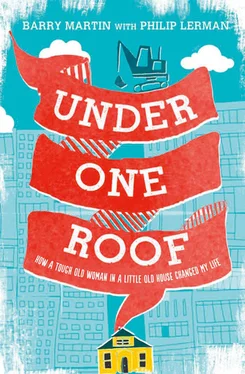The first day of breaking ground still gets to me after all these years of working construction. It’s that sense of anticipation you feel on the first day of school – excited and nervous all at the same time. Especially when you break ground in springtime. There’s something about that fresh spring air that gets in your blood, and it was getting to me as I walked the streets of Ballard that morning, although, to be honest, Edith’s block was no bed of roses. Her street still had a lot of those transients living in cars, and you could see a few of them sleeping in their dilapidated old vehicles that morning. They had a tendency to clean out the nearby Dumpsters and then toss whatever garbage they had right outside the cars, and use the weeds for their Porta-Potty, so it wasn’t the most savory atmosphere you could imagine. Pretty disgusting, actually.
But as I approached Edith’s house, I got a strong whiff of fresh-mown grass, and it took me back to when I was a kid, mowing lawns for quarters. Same thing happens to me in the fall, the smell of leaves and the snap in the air. It takes me back to when I’d go hunting with my dad. Those smells bring you back to happy times, and they kind of bring the happiness back with them. It’s a good feeling.
In the springtime I always think I’m smelling the bubble gum that came with baseball cards. I was probably imagining things, but that’s what it felt like as I approached Edith’s front gate. For just a moment, you feel like a man and a child all at the same time.
Most of the sidewalk on Edith’s block is overgrown with blackberry bushes, but they stop at her property line. Her yard is like a little clearing in that jungle. Within that clearing, Edith’s house looks like something out of a storybook. A compact building, two floors, plus a basement that peeks up out of the ground, the whole thing maybe twenty feet wide. It’s set about ten feet back from the sidewalk and the ground slopes down toward the house so the foundation is a good three feet lower than the street in front of it, making the house seem even smaller than it is. Or as if the house is crouching a few feet from the street, tired from too many years of trying to stand up straight.
There’s a tiny entranceway in front, with an arched opening. It looks like the miniature house on the front of a Swiss cuckoo clock, and you half expect a little wooden soldier to come sliding out of it every hour on the hour. There’s a small patch of grass, which Edith kept neat and tidy. It’s somewhat overgrown with dandelions now, but when I first walked past the house, it was one of the first things I noticed: how tidy the lawn was. It brightened up the neighborhood: a beautiful oasis in that ugly place, with irises planted all around it. It felt welcoming, and drew your eye away from all that urban decay. It made me feel good to see someone who, from outside appearances anyway, was happy with how she had things, especially when what she had wasn’t much. Most people complain about what they don’t have; here was someone making the most of what she did have.
Edith was tending her garden that morning. Kneeling down like that, it looked like she was praying, or looking for something she’d lost. My first reaction was one of relief. She reminded me of my great-grandma, a small, sweet, meek-looking lady, like someone in a storybook who would have a mouse for a pet. I was still a little leery, though, because I didn’t know how she was handling the news about the construction, and because of what the guys had told me about her.
“Hi, I’m Barry Martin,” I said. “I’m going to be building this project around you.” I braced for the worst.
“Well, I’m pleased to meet you,” she said, rising slowly, like she was unfolding her limbs one by one. “I’m Edith Wilson Macefield.”
A concrete truck from the Salmon Bay Concrete Plant a half-block down from her house roared past us, keeping us from talking for a moment. We sized each other up in silence, waiting for the truck to pass. Even standing up, Edith was a little stooped over, with a hunch to her back, and hazel-blue eyes that didn’t quite both look at you at the same time. She had to pick one eye to fix on you, but she made up for it by looking at you straight and hard, and not letting go of your gaze once she had it. She was a thin woman with white hair and a wide face, and looked like the kind of person who cared more about her appearance than you might expect of someone that age, especially someone seemingly so isolated. She was wearing a blue knit sweater and a pair of slacks and some garden gloves, and she pulled off one glove, walked over, and shook my hand. Even though she was small and frail, her handshake seemed strong and confident. I was relieved – the anger I’d expected from her hadn’t materialized. But I felt a little sad, too, to see this old woman, apparently living so alone.
“Well, nice to meet you, Miss Macefield,” I said. The concrete truck had passed, and the rumble of cars coming over the bridge had stopped for the moment; all of a sudden the air was still and silent, the way it gets on a warm spring day. You could hear someone mowing a lawn a few blocks away, it was that quiet.
I had introduced myself to just about everybody who would be affected by the project, but as much as I knew this was all just part of the job, this particular introduction seemed different – I mean, we were going to build a shopping mall all around this lady’s house. I couldn’t imagine what that would be like. Or actually, I could. A hell of a lot of noise and dirt and debris and destruction. I had the urge to sugarcoat it a bit, to try to make it seem less disturbing than it was likely to be; but one look at Edith and you knew: this was not a lady who took her medicine with a spoonful of sugar.
“Miss Macefield, I just want to let you know we’re going to be making a whole lot of noise and creating a big mess. There’s no way around that. But if you ever need anything, or have any problems, here’s my number. Don’t hesitate to call.”
“Well, that’s very nice of you,” she said, taking my card, holding it up close to one eye, then tucking it into a front pocket of her slacks. “I’m glad to have you here. It’ll be nice to have a little company.”
As we talked, she picked up a bag of birdseed and started spreading it on the sidewalk.
“Like to feed the birds, do you?” I asked.
“Every morning,” she replied. “I’m running late today. Had a little trouble with insomnia last night, so then I fell asleep and woke up a little late.”
“Well,” I said, “let us know if you need anything.”
“Thank you,” she said, and then, as I walked away, I heard over my shoulder: “You can call me Edith.”
I heard the rumble of the cars across the bridge nearby. I thought I got a whiff of that baseball-card bubble gum, too. I looked back and saw Edith struggle to get down to her knees, until her whole form was tucked behind the chain-link fence that faced her house, as though she had revealed just a little bit of herself, just for a moment, and now she was going back into hiding.
It’s funny how the most momentous conversations of your life – or the ones that turn out to be the most momentous – can seem, in the moment they happen, so mundane.
I stopped one more time and turned back to look at the house, standing lonely and deserted on that broken-down street. It seemed impossible, but the developers had already offered Edith $750,000. Three quarters of a million dollars, probably ten times what the house was worth – and she turned them down cold. I guess I should have known going into it that I would run into people who would give me a hard time, building a big, hulking mall around that tiny house. The other side of town – if you looked to the left of the Ballard Bridge as you crossed into town, instead of to the right toward Edith’s house – was already the site of a lot of new development, development that many people thought was killing the character of good old Ballard. And the deals had been closed to build a whole lot more. Because Edith’s was the last house standing on her block, people saw her as a symbol, a force against “yuppification,” against the overdevelopment of old neighborhoods with character and charm. I was the man bringing in change, she was the woman who wanted things to stay the same. That same Seattle Times columnist who wrote the story about the homeless people, Danny Westneat, had also written a column in February about Edith’s so-called last stand. A few days later, he wrote about how that column had “unwittingly unearthed an entire community of folks who have been captivated by her for years.” He quoted one resident as saying, “I salute her for standing up to some of the ‘progress’ that’s coming to Ballard.” Another one wrote, “I’ve come to love this lady, and I don’t even know her.”
Читать дальше











